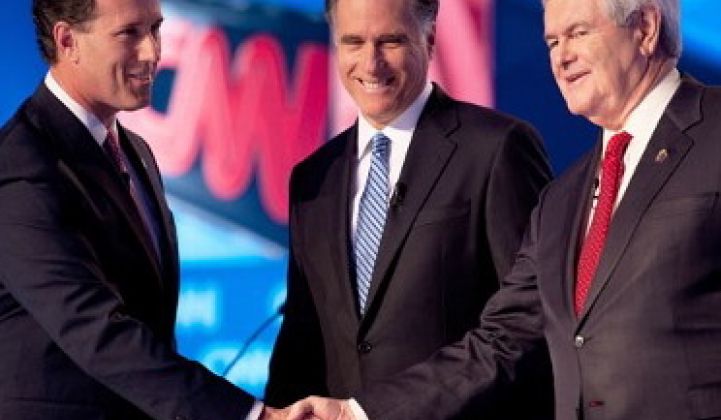Although the GOP presidential primary race remains fluid, the front-runners are now Newt Gingrich, fresh from a victory in South Carolina, and Mitt Romney, the second-place finisher in Iowa and South Carolina and first-place finisher in New Hampshire.
Barring a brokered convention, one of these gentlemen will likely be the GOP candidate with a chance of becoming the next U.S. president. What follows is a distillation of each candidate's most recent energy policy statement.
Romney's Energy Plan
The Romney platform is called "Believe in America: Mitt Romney’s Plan for Jobs and Economic Growth"; it also contains the candidate's energy policy.
But before Romney details his plan, he takes some swipes at the Obama administration's energy plan:
As the Obama administration wages war against oil and coal, it has been spending billions of dollars on alternative energy forms and touting its creation of “green” jobs. But it seems to be operating more on faith than on fact-based economic calculation. To begin with, wind and solar power, two of the most ballyhooed forms of alternative fuel, remain sharply uncompetitive on their own with conventional resources such as oil and natural gas in most applications. Indeed, at current prices, these technologies make little sense for the consuming public but great sense only for the companies reaping profits from taxpayer subsidies.
Romney's document accuses the Obama administration of having an "unhealthy obsession with green jobs" and cites studies which show that green jobs might actually hurt employment rather than help it. Obama's delay of the construction of the Keystone XL pipeline is also labeled a job killer; the document cites an arguable figure of 100,000 jobs lost in not constructing the pipeline that would originate at the Alberta Tar Sands.
Here is Romney's energy outline.
Regulatory reform.
- Streamline permitting
- Overhaul the Clean Air Act, Clean Water Act, and other environmental laws.
- Reform nuclear regulation: As president, Mitt Romney will seek to streamline NRC procedures so that licensing decisions for any reactors to be built with an approved design on or adjacent to an existing site are completed within two years. And he will expand NRC capabilities so that the agency is able to review and approve several types of certified reactor designs in a way that ensures safety and reliability.
Explore and develop domestic oil reserves. This includes the Gulf of Mexico, both the Atlantic and Pacific Outer Continental Shelves, Western lands, the Arctic National Wildlife Refuge, and off the Alaska coast; it includes not only conventional reserves, but more recently discovered shale oil deposits as well.
Partner with Canada and Mexico.
Extract shale gas and "prevent overregulation of shale gas development and extraction."
Research and development. Redirect clean energy spending towards basic research instead of loan guarantees, cash grants, and tax incentives. The federal government should move funding "through programs such as ARPA-E that seek to replicate DARPA's success in energy-related fields."
Romney does not support cap-and-trade or the Kyoto Treaty. Romney's viewpoint on global warming, according to a spokesperson: "He believes it’s occurring, and that human activity contributes to it, but he doesn’t know to what extent."
Newt Gingrich's American Energy Plan
Gingrich's energy plan also focuses on domestic supplies of oil and gas as well as shale oil, with the added element of replacing the EPA with "an Environmental Solutions Agency."
- Remove bureaucratic and legal obstacles to responsible oil and natural gas development in the United States, offshore and on-land.
- End the ban on oil shale development in the American West, where we have three times the amount of oil as Saudi Arabia.
- Give coastal states federal royalty revenue sharing to give them an incentive to allow offshore development.
- Reduce frivolous lawsuits that hold up energy production by enacting loser pays laws to force the losers in an environmental lawsuit to pay all legal costs for the other side.
- Finance cleaner energy research and projects with new oil and gas royalties.
- Replace the Environmental Protection Agency, which has become a job-killing regulatory engine of higher energy prices, with an Environmental Solutions Agency that would use incentives and work cooperatively with local government and industry to achieve better environmental outcomes while considering the impact of federal environmental policies on job creation and the cost of energy.
Gingrich's current take on global warming is that it is uncertain if anthropogenic global warming is real. He told Fox News' Sean Hannity in an interview last month, "I believe we don't know."
If there is a change in the Republican rankings in the weeks ahead, we'll get you the Ron Paul and Rick Santorum energy plans.



